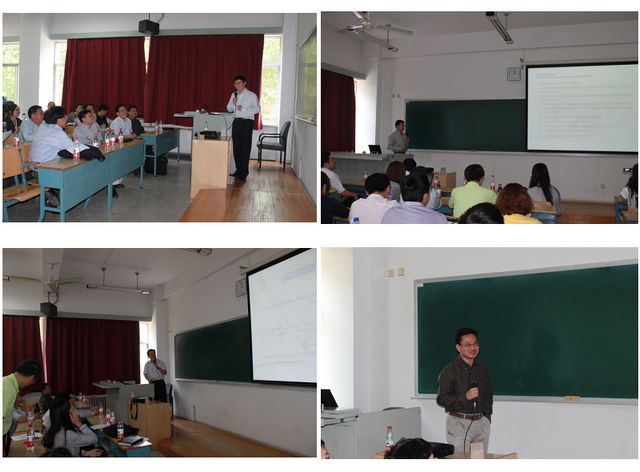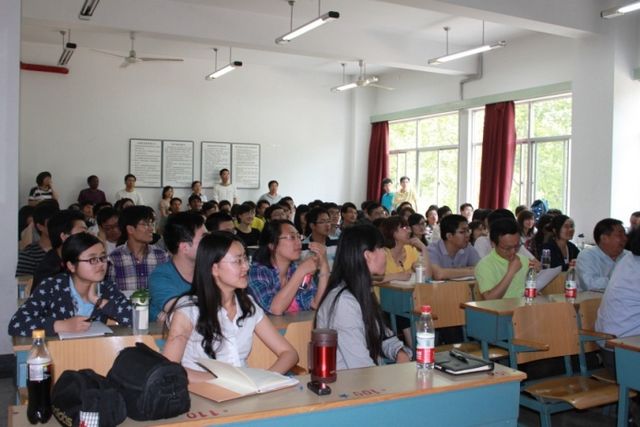美国佛罗里达大学谢会开教授一行到访北理工开展“21世纪学科前沿”学术讲座活动
华体会体育(中国):2011-05-31 阅读次数:
供稿、摄影:苏日娜 编辑:刘娜
5月27日,应我校信息与电子学院邀请,美国佛罗里达大学谢会开教授、威斯康星大学麦迪逊分校江洪睿副教授、德克萨斯大学奥斯汀分校张晓晶副教授,新加坡国立大学周光亚博士等一行四人来我校访问,开展了“21世纪学科前沿”学术交流之“MEMS前沿技术研究”讲座活动。我校教务处处长仲顺安教授、信息与电子学院院长龙腾教授以及我校100多位师生参加了此次讲座。

四位教授为我校师生带来了一场题为“Microendoscopic 3D Infrared Imaging for Early Cancer Detection”,“Controlled Microfluidic Interfaces and Their Applications”,“Engineering the Future of Healthcare at the Micro and Nano Scale”,“Tuning Photonic Crystal Nanocavities with MEMS”的系列讲座。教授们的报告深入浅出,他们用敏锐犀利又不乏幽默的语言,围绕国际前沿的生物医学MEMS、光学MEMS等进行了多角度的分析并介绍了自己所在科研团队的研究发展情况。与会师生认真听取了此次报告,并进行了热烈的交流。

在交流互动环节,各位教授用亲切幽默的语言为同学们解答了美国文化、美国学生培养、出国留学申请、个人成才、科研方法等问题。通过此次学术交流活动,与会师生对当今MEMS前沿技术领域有了更深入的了解,对今后的科研学术产生了深远影响。
教授简介:
谢会开
Huikai Xie is a Professor at the Department of Electrical and Computer Engineering of the University of Florida. He received his BS, MS and Ph.D. degrees in electrical engineering from Beijing Institute of Technology, Tufts University and Carnegie Mellon University, respectively. Before he joined the University of Florida in 2002, he worked at Tsinghua University (1992-1996), Bosch Corporation (2001), and Akustica Inc. (2002). He has published over 170 technical papers and holds more than 20 US patents. His current research interests include MEMS/NEMS, integrated inertial sensors, sensor interface circuits, microactuators, integrated power passives, CNT-CMOS integration, optical MEMS, biophotonics, IR spectroscopy and miniaturized medical devices. His research has been funded by NIH, NSF, DoD, DoE and NASA as well as several high-tech companies. He also founded or co-founded three startup companies, WiOptix Inc. in Florida, Senodia Technologies in Shanghai, and WiO Technologies in Wuxi, China. He has served on the technical program committees of various international conferences, including the IEEE International Conference on Optical MEMS and Nanophotonics, the IEEE Transducers, and the IEEE Sensors Conference. He is a senior member of IEEE and OSA, and a member of SPIE and ASEE.
江洪睿
Hongrui Jiang received the B.S. degree in physics from Peking University, Beijing, China, and the M.S. and Ph.D. degrees in electrical engineering from Cornell University, Ithaca, NY, in 1999 and 2001, respectively. He was a Postdoctoral Researcher at the Berkeley Sensor and Actuator Center, University of California-Berkeley, Berkeley, from 2001 to 2002. He is currently an Associate Professor with Department of Electrical and Computer Engineering, a Faculty Affiliate with the Department of Biomedical Engineering and a faculty member of the Materials Science Program, University of Wisconsin (UW)-Madison, Madison. His research interests are in microfabrication technology, biological and chemical microsensors, microactuators, optical MEMS, smart materials and micro-/nanostructures, lab on a chip and biomimetics and bioinspiration. He received the US National Science Foundation CAREER Award, the US DARPA Young Faculty Award in 2008, and the University of Wisconsin H. I. Romnes Faculty Fellowship.
张晓晶
Dr. Zhang is an Associate Professor at the University of Texas of Austin (UT Austin) in the Department of Biomedical Engineering, with joint affiliations with Institute for Cellular and Molecular Biology (ICMB), Microelectronics Research Center and Texas Materials Institute. He received his Ph.D. in electrical engineering from Stanford University, California in 2004, and was a Research Scientist at Massachusetts Institute of Technology (MIT), Cambridge, before joining the faculty at UT Austin in 2005. Zhang laboratory is developing integrated photonic microsystems (MEMS, micro-electro-mechanical systems), semiconductor chips and nanotechnologies for imaging, sensing and regulating cellular processes critical to healthcare, environmental and defense applications. Dr. Zhang has invented several unique methods to characterize multiscale biology interfaces using silicon photonic sensors on probe. His early efforts to provide massively parallel micrograting embedded cantilevers for force measurement on self-assembled embryos and cells may potentially lead to significant breakthroughs in genetic studies. His current research focus includes: silicon opto-fluidic devices for circulating tumor cells detection and analysis, phase-modulating scanners for in vivo sub-cellular early cancer diagnosis, and quantum dots based near-field imaging nanoscopes to detect, for example, the bio-distributions of drug-delivery nano-carriers in tumor. In addition to being the Principle Investigator of many major grants from federal agencies such as NIH, NSF and DARPA over the past 5 years, Dr. Zhang was also recipient of many prestigious awards, including: the Wallace H. Coulter Foundation Early Career Award for Translational Research in Biomedical Engineering in 2006, the British Council Early Career RXP Award in 2008, NSF Faculty Early Career Development Program (NSF CAREER) Award in 2009-2014 and DARPA Young Faculty Award in 2010.
周光亚
Dr. Zhou received the B.Eng. and Ph.D. degrees in optical engineering from Zhejiang University, Hangzhou, China, in 1992 and 1997, respectively. He is currently an assistant professor with the Department of Mechanical Engineering, National University of Singapore. He has published more than 100 research papers in international journals and conferences. His main research interests include microoptics, diffractive optics, MEMS devices for optical applications, and nanophotonics.
(审核:党华、张笈)



